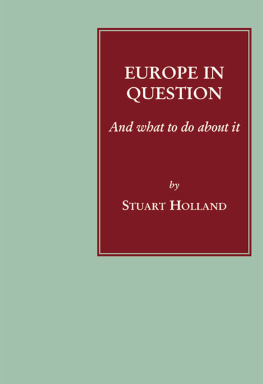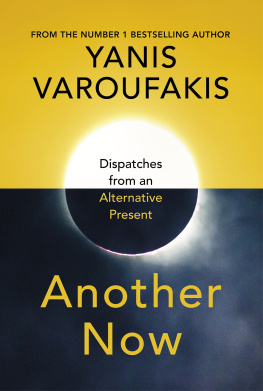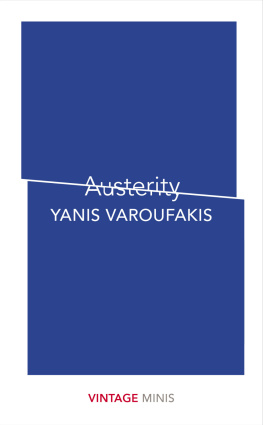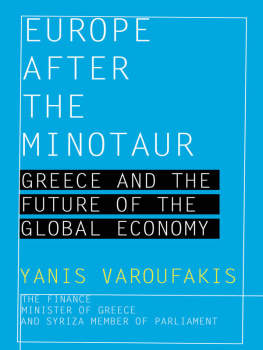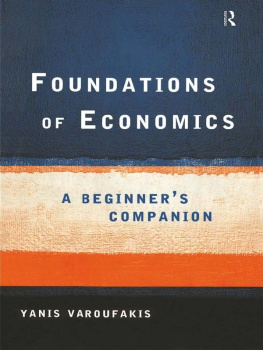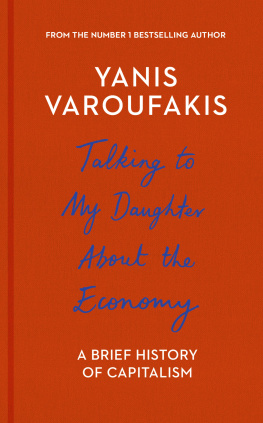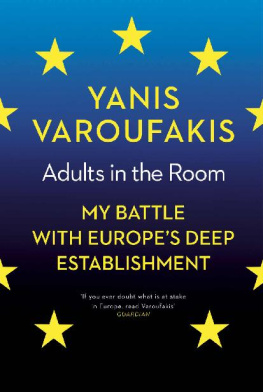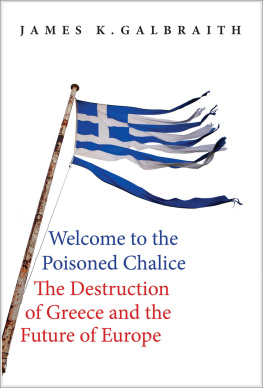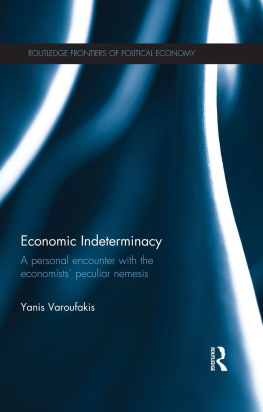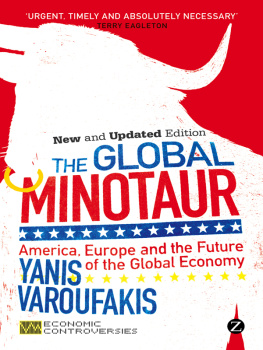Europe in Question - and what to do about it
Stuart Holland
He is not a good citizen who does not wish to promote, by every means in his power,
the welfare of the whole society of his fellow-citizens.
Adam Smith. The Theory of Moral Sentiments , 1759, Part VI, Section II.
In memory of Ken Coates and Egon Matzner
brilliant advocates of a democratic and social Europe
and to Alex and his generation, trusting that the book may help them achieve it
Annex
A Modest Proposal for Resolving the Eurozone Crisis
Yanis Varoufakis, Stuart Holland and James Galbraith
Figures
1.1: Jastrow-Wittgenstein and Gestalt
1.2: Deflation by Decree: Weimar and Greece
5.1: Denial, Projective Identification and Forecasting
10.1: Keynes, Fisher and Gestalt
10.2: Friedman, Fisher and Gestalt
10.3: Recovery and a European New Deal
12.1: Asymmetric Global Capital and Labour Flows
13.1: Psychological and Social Contracts
15.1: On the Centrality of Human Value
16.1: The G20 and a World Development Organization
Tables
10.1: Multipliers from Public Spending and Investment
12.1: Europes Lagging Small and Medium Firms
14.1: Denial of New Deal Employment Creation
Acknowledgements
Without having known and worked with many of the politicians cited in the book it would have been different - even if Europe itself would have been different if Harold Wilson had followed through the confederal opening when Charles De Gaulle agreed to a 2nd British application to join the EEC.
Knowing Jacques Delors since the mid-1970s and being able to work with him on policies and institutions that could realise the cohesion pillar of the 1986 Single European Act was invaluable, as was Andreas Papandreous endorsing the call for a New Messina conference which had led to it. As was working with Antonio Guterres when he was prime minister of Portugal and would go into a European Council in a minority of one, but then win, as he did in gaining the case for the terms of reference of the European Investment Bank to be extended to finance investments in health, education, urban renewal and the environment.
To be shadow minister for development in the 1980s when Neil Kinnock was Leader of the Opposition was brilliant, and when Neil showed leadership qualities in turning the Labour Party on Europe that Harold Wilson lacked. Not in the sense that Europe since has been a success. Its current failure risks disaster. But that when capital is multinational, politics also should be so while the agenda Neil jointly endorsed with Andreas Papandreou and Franois Mitterrand still is relevant to this.
Giuliano Amato and Romano Prodi, formerly prime ministers of Italy, have been strong advocates of several of the proposals made in the book. As were Ken Coates and Egon Matzner both in the Out of Crisis initiative of the early 1980s and after, when Ken also was a member of the European Parliament. Working with Willy Brandt, Michael Manley and other members of The Socialist International on what became its Global Challenge report was a privilege and led to strong interest in its proposals from parties in Latin America and from the governments of India and China which still are relevant to the feasibility now of global economic governance.
In a more conventional sense of acknowledgements I am indebted to Gerald Wooster, a psychoanalyst, who encouraged me to develop the relevance of splitting and projective identification to how the European project has failed to fulfil its initial aspirations, as well as to Henry van Maasakker for briefings on materials I could have missed and for a range of insights that I lacked. I also owe much to colleagues in the Faculty of Economics of the University of Coimbra, where I have been welcomed as a Visiting Professor for some time, including Teresa Carla Oliveira, co-author of several papers cited in the book.
As well as to Raphael Kaplinsky who introduced me to the case that it was the failure of flexible labour markets that led to flexible production and continuous improvement in Japan. Also to Yanis Varoufakis and James Galbraith both for their good humour and friendship, and for their joint authorship of The Modest Proposal appended to the book. Which is modest only in reflecting one of its main themes that Europe does not need new institutions, or new treaties, or fiscal transfers, or federalism to resolve the Eurozone crisis and restore what have been usurped rights of national democracies. The final stages of preparing the text were supported by the European Union and the State of Hungary, co-financed by the European Social Fund in the framework of the TMOP 4.2.4. A/2-11-1-2012-0001 National Excellence Programme.
Biographical Note
Born in 1940, Stuart Holland studied and taught history and political theory at Oxford, then became an adviser to Harold Wilson on European affairs and in 1967 gained the consent of Charles De Gaulle for a 2nd British application to join the European Community on the basis of a confederal Europe, mutual currency support and a European Technology Community.
Resigning from No. 10 when Wilson did not follow this through, he finished an economics doctorate at Oxford and taught at Sussex University. His case that Britain needed selective public ownership of big business and banks, accountability of multinational companies and an industrial policy was adopted in the economic programmes of the British Labour Party for a decade from 1972 but also strenuously resisted by Wilson and other members of the 1974-1979 Labour government.
From 1979 to 1989 he was a Labour Member of Parliament and then worked with Jacques Delors on EU policies for economic and social cohesion. His 1993 proposals to Delors for EU bonds to offset the deflationary effects of the Maastricht debt and deficit criteria were supported thereafter by heads of state and government at successive European Councils but not enacted. Eurobonds then hit headlines from the onset of the Eurozone crisis when opposed outright by Angela Merkel and German finance minister Wolfgang Schuble. Whereas, from September 2014 an initiative for an investment led recovery financed by EIB bonds was on the agenda of European finance ministers and could in principle achieve the 1993 design for them.
His earlier advice to Andreas Papandreou, backed by Franois Mitterrand, prompted the first revision of the Rome Treaty with commitment to the principle of economic and social cohesion in the 1986 Single European Act. His later advice to Portuguese Prime Minister Antonio Guterres resulted in a cohesion and convergence remit for the European Investment Bank to invest in health, education, urban regeneration and the environment.
He has published papers and books on economic theory, social and political theory, public enterprise, planning, regional policy, economic integration, international development and global economic governance. He currently is a Visiting Professor in the Faculty of Economics of the University of Coimbra, Portugal, and Senior Research Scholar of the Institute for Social and European Studies at Kszeg, Hungary within a programme jointly funded by the the European Social Fund and the government of Hungary.
Introduction
This book is in part autobiographical since, for better or worse, I have been an actor since the 1960s in initiatives to try to gain a democratic and social Europe in which markets would serve people rather than people serve markets whereas, since the onset of the Eurozone crisis, the European Union has been sacrificing their wellbeing and welfare on the altar of austerity.
It is commonplace to attribute this failure to design faults for the introduction of the euro. But

